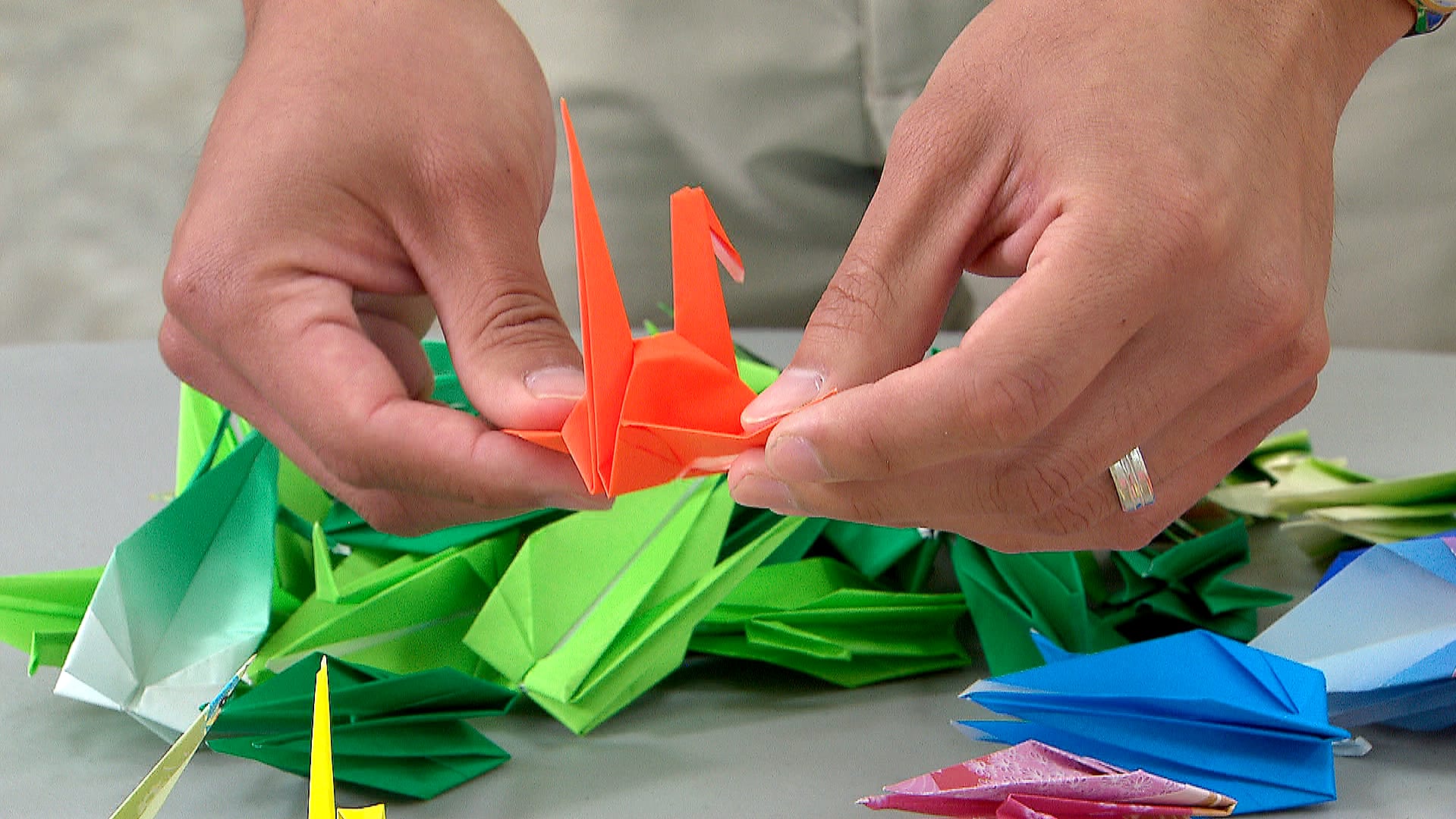Thousands of paper cranes from Manitoba Japanese association honour children lost at residential schools
 400
400
The Japanese Cultural Association of Manitoba says the cranes represent peace and reconciliation
Peggy Lam · CBC News
Posted: Jun 23, 2021 5:00 AM CDT | Last Updated: June 23, 2021

Dr. Kelly Kaita, left, and Yuhito Adachi, right, from the Japanese Cultural Association of Manitoba pose with their paper cranes. (John Einarson/CBC)
Yuhito Adachi folds a square piece of origami paper with printed cherry blossoms in half, pressing down firmly on the crease to form a triangle.
"It takes about one minute and 20 seconds to do a full one," he said.
He's on his hundredth paper crane. As he finishes up the bird, he places it on the table next to a pile of 3,000 others.
Adachi is secretary of the Japanese Cultural Association of Manitoba. He's responsible for stringing together the thousands of paper cranes being folded to honour the 215 children who are believed to be buried in unmarked graves at the former Kamloops Indian Residential School in British Columbia.
WATCH | Members of the Japanese community in Manitoba fold thousands of paper cranes:

Thousands of paper cranes honours children lost at residential schools
2 years ago
Duration 2:07
Manitoba's Japanese community is folding thousands of paper cranes to donate to local Indigenous organizations. The idea was sparked after remains of 215 children were discovered on the grounds of the former Indian residential school near Kamploops, B.C. The cranes represent wishes of peace for the children who died.
The idea for came about when Dr. Kelly Kaita, the association's president, was sitting at the dinner table with his wife after watching the news.
"There's all this news about every child matters, reconciliation for education, and we felt it was very important for the Japanese Cultural Association to somehow support this cause," he said.
His wife said folding a thousand cranes would show support in a very meaningful way, so they reached out to the association's members, asking them to contribute.
"We were hoping to have a thousand cranes folded and delivered to our centre. In fact, we've had over 3,000 cranes folded from as far as Tokyo to show support for this very important cause," said Kaita.
A wish for truth and reconciliation
Kaita said the significance of folding a thousand cranes originates from a long-told Japanese legend.
"The individual who folds a thousand cranes would be offered one wish, and that wish may be happiness, good health, what have you," he said.
Once the cranes are completed, the Japanese association will donate them to local Indigenous organizations, such as the Ma Mawi Wi Chi Itata Centre in Winnipeg, said Kaita.
"Giving [them] to an organization such as Ma Mawi Wi Chi Itata would allow them to have that wish bestowed upon them, which would really be the truth and reconciliation of everything that's ongoing right now," he said.
Adachi said for him, every crane represents hope and a prayer for the children who didn't survive residential schools.
"That way, they can rest in peace," he said. "When I heard about the 215 children most likely forcibly removed from their parents, and they couldn't even make it to their successful life, I felt very sad."

Kaita said the cranes also symbolize the Japanese Cultural Association of Manitoba's commitment to reconciliation.
"We've had that long-standing relationship with our First Nations friends and we'll continue that support in any way that we can," he said.
The Ma Mawi Wi Chi Itata centre says it's honoured to be selected for the gift and is currently working with its executive team to co-ordinate how to receive the cranes in a way that acknowledges the significance.

